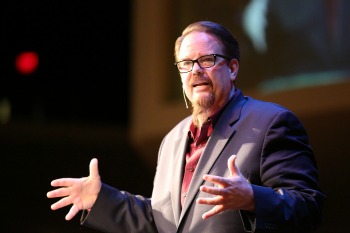Lyons, Stetzer, Mohler address issues facing the church
“We need to cultivate a new type of approach that allows us to move forward in our cities,” Gabe Lyons, founder of Q Ideas and author of “The Next Christians,” said at the KBC’s RISK conference Feb. 24.
Lyons, described by Chuck McAlister as “one of the foremost experts on reaching millennials,” addressed the topic of “questions, why they matter and how to engage culture.” He was joined by Ed Stetzer and Albert Mohler on the platform of Louisville’s Highview Baptist Church.
“If anybody is going to care about your story, it’s going to start with you having an understanding and an interest in the community you’re in and how you’re engaging it,” Lyons said.
He presented four questions and proposed solutions for engaging the culture: 1) “What is wrong?” then “stop and confront,” 2) “What is confused?” then “clarify and compel,” 3) “What is good?” then “celebrate and cultivate,” and 4) “What is missing?” then “create and catalyze.”
“When we ask these questions and we finally have a tone that’s winsome and loving and kind, we will demonstrate in our communities what it means for the church to go forward in an age where the church in many cases has been condemned,” Lyons concluded.

Ed Stetzer, executive director of LifeWay Research
Stetzer, executive director of LifeWay Research and author of “Transformational Groups,” said, “Part of the reason church is so challenging is because people have the perception that church is dying, when no serious researcher believes that to be true.”
Although mainline Protestantism is declining, the evangelical church has experienced a slight decline, but is now plateaued, Stetzer said, noting that some scholars refer to evangelicals as “battered and triumphant.”
Stetzer continued, “I’m concerned about the trajectory, I’m concerned about the passion, I’m concerned about the lack of gospel engagement, and I’m concerned that in the midst of our society today we’re finding ourselves in a more secular environment.”
Culture, however, is experiencing a “rise of the nones” or college students who identify with no religious group.
And, even though the majority of Americans still identify themselves as Christians, they tend to think, believe and want to order society more around secular values, he explained.
“We see future before us,” he said. “The mission field is changing; the mission force has to be engaging.”
Albert Mohler, president of Southern Baptist Theological Seminary and author of “The Conviction to Lead,” addressed, “Where is the church headed?”
“Those who are my age and older need to fess up; we didn’t see this coming,” Mohler said regarding the current state of culture. “The future wasn’t headed towards us; the future was headed away from us,” he observed.
Drawn from timeless themes of the New Testament, Mohler suggested some places the church is headed. They included “into the world to make disciples,” “into trouble,” and “for a glory yet to be revealed.”
Some of his thoughts about where the church is heading are “into a post-Christian age,” “into a revolution of morality,” “into hostility,” and “into radical diversity.”
“We’re going to find out who merely has (Scripture) verses and who has a biblical theology. The only way we’re going to survive is to love in and live out Scripture,” Mohler added.
“Wherever the church is headed, Jesus Christ is Lord; that’s enough,” he said. (WR)
Myriah Snyder